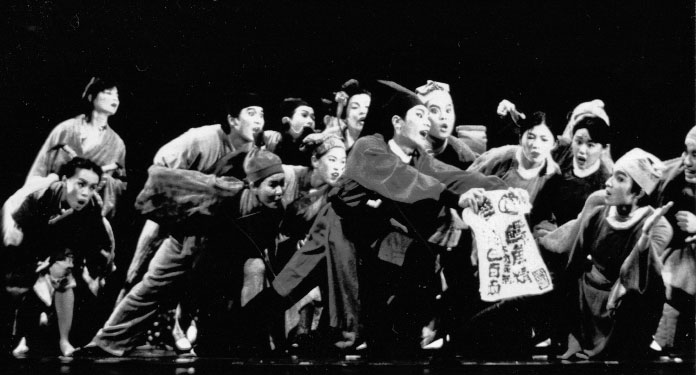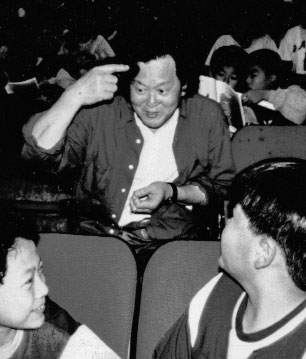Taiwan, Hong Kong, UK & Japan Taiwan in the MindMay 1996
A writer Huan Ch’un-ming and the citizens
In Taiwan, where the direct presidential election that was counted as a ‘finishing stroke of democratization’ was held, the people were excited with the political reform. But a popular writer specializing in social issues Huan Ch’un-ming, who is also well-known in Japan for his Japanese version of Sayonara Good-bye, kept himself aloof from the bustle and devoted himself to village revitalization and children plays. I wanted to know why he was doing so and what Taiwanese citizens thought of the political reform.
The reproduction of Taiwanese traditional houses and
the collection of disappearing dialects

I drove to Yilan County, Huan’s hometown, on the national road, which ran between the Pacific Ocean and the projected site for a nuclear power station. The village to be vitalized is Meihua Community, which was formed by a merge of three villages seven years ago. It is a farming village with a population of only 1,490. Houses in this area were built of wood, bamboo and thatch obtained from the hills and fields. They are surrounded with protective walls from a typhoon, which hits this area every year. The walls were built of stones removed from the farming land. However, as Taiwan has been industrialized rapidly, many young people left the village. After the remaining old people died, these houses are left to utter dilapidation.
Huan Ch’un-ming said, “Traditional houses have been built in a suitable way to the climate. The students of the department of architecture are learning how to build a high-rise building, but they don’t know anything about a Taiwanese traditional house.” Worrying about the present state of the village, he is going to hold a seminar on the reproduction of a house of 200 years ago for the students this summer. Old men skilled in building a Taiwanese traditional house are willing to teach how to collect the materials and how to build a traditional house at the seminar. He also calls for the villagers to preserve their houses and articles of everyday use, for purposes of the conservation of the historical views and the construction of a folklore museum. The houses, however, will not stand long unless tourists come and the young people come back to take care of them. So he is also planning on tourist development, giving a careful consideration to environment. The projects “Performance Square” and “A Grove of 10,000 Plum Trees” are now on foot.
It is not only houses that are dying out. Taiwanese dialects are in danger of extinction. Huan Ch’un-ming, who has used Taiwanese dialects in his novels and movies for a long time, hurries to collect dialects to compile a dictionary by visiting villages. The original languages of benshengren, who have lived before the Qing dynasty, are Minnan, Hakka and aboriginal languages. But they were forced to speak Mandarin following Japanese. They were not allowed to use their own languages at school and in the media for nearly 100 years. But from the 80s they have been gradually allowed to use them in public. Most of the young people, however, cannot read or write those languages, even if they can speak them.
I asked him the reason why he devoted himself to village revitalization, the compilation of a dialect dictionary and children plays. “Not only Taiwanese politics and economy but also their languages and customs have been ruled by Japan and the Kuomintang. So it is not too much to say that the people had not been allowed to think this land belonged to them before this direct presidential election. That’s why they feel uneasy about their ethnic identities. They have to renew their understanding of their own cultures to have faith in their ethnicity.”
Where is the Earthly Paradise?

It is the tradition and culture of benshengren that Huan Ch’un-ming tries to revive in Meihua Community, but the children play he is now working on deals with a bigger theme involving the significance of village revitalization.
The children play the New Peach Blossom Spring written and directed by Huan Ch’un-ming was performed in five local cities of Taiwan this April. “Aside from politics,” he said, “Taiwanese culture is umbilically bound up with China. Culture, however, is not formed by copying but by assimilating new interpretations and ideas.” The play is based on The Peach Blossom Spring written by a poet Tao Yuan-ming (317-420), and the players’ make-up methods and movements are taken over from classical Chinese opera, but it is not the reproduction of the classic. The original is an escapist story from the harsh reality. But he interprets it differently. He thinks people don’t have to go far away to find the Earthly Paradise because it exists within everyone’s heart. He adapted such abstract and difficult contents of the story into a light musical so that children could enjoy the play.
“Where is your paradise?” I asked Li (24), a student of the department of English language and literature of Soochow University, who was putting up her make-up in the dressing room. “My paradise is Taiwan,” she said, “Because I was born and bred here. My family and friends live here. Whatever may happen, Taiwan is my paradise.” She answered as if her answer had been arranged beforehand. The volunteer members of theatrical company were recruited through the newspaper. Among the members are students including Li, a primary school teacher, a magazine editor, a worker of a government-managed company and a worker of the Executive Yuan. Sympathizing with Huan, they are appearing on the stage on leave. When I asked the same question to the children who came out of the theater, they said, “School!” or “Maybe home, because it’s cozy.” But some of them said prankishly, “A game center!” or “It was in the theater.” If an earthly paradise is within everyone’s heart, the paradise will be their hometown, that is to say, the paradise for Taiwanese is Taiwan. It seems that he successfully made the point of the play understood.
Incidentally the play has a happy ending. When the villagers make friends with their enemy, a gluttonous giant eel, by feeding, peace and prosperity returns to the village. Then the villagers realize that the Earthly Paradise that they are looking for is their own village. It seemed to me the giant eel implied China, but Huan only said, “Human beings should live together with Nature as a part of the ecosystem.” Although he is eloquent, he didn’t mention anything about the relationship between China and Taiwan, which may be changed when Taiwan is democratized.
Democratization = ‘Taiwanization’
The driver (48) of a taxi that I happened to ride in said, “A state needs dignity. Taiwan should be independent before the armed forces of CPC (China) become too strong.” He was dead serious. A woman (37) with a child sketching a temple said, “Since China repeats split and unity historically, Taiwan and China will be united soon or later. I will send my child abroad to study so that she will live a secure life.” She worries about the future of her child. Taiwanese people finally gained freedom by themselves after paying a heavy price, but their mind is shaken with hope and anxiety, probably because they have suffered from oppression for a long time.
Huan Ch’un-ming has portrayed Taiwanese hard lives and his indescribable feelings in his novels and movies. In the 1960s, his story of the citizens’ voices he collected as a radio reporter was killed under pressure from the authority, and he was taken to the police under the accusation that there were problematic thoughts in his novel. “Have you ever been arrested as a political criminal?” I asked. “No,” he replied and told me the secret of having kept on writing. “I set the target just a little above the limit, created the characters very carefully and used a lot of figurative or metaphorical expressions. Those techniques made my works more interesting,…” Now I understand why he avoids speaking plainly of the relationship between China and Taiwan and the issues of unity and independence.
Huan, who loves Taiwan and Taiwanese people, has never changed his opinion, although it was regarded as anti-Establishment. But Yilan Country Magistrate Yu Hsyi-kun offered support to the “village revitalization” activity and the Board of Education of the Taiwan Provincial Government sponsors the performance of this play. What it amounts to is this, that the KMT government has changed. The KMT came to Taiwan just after Japan had left and governed Taiwan autocratically. But today’s KMT members are second or third generation Taiwanese born in Taiwan. In such state of things in Taiwan, “democratization” is nothing but “Taiwanization.”
In Nantou City, where the last performance of the play will be presented, I took a walk. I was surprised to see that dishes like Japanese home cooking were served at an ordinary restaurant as if it was not surprising. Then I also saw people burning red paper for the dead in the middle of the street without paying any attention to cars. Huan explained about these scenes. “Today’s Taiwanese culture is like half-Chinese half-Japanese. But even a child born through a sinful marriage is blameless and it has its own character.” When Taiwanese people reach a consensus on the ethnic identity after accepting this history full of bitterness, Taiwan will be a real paradise for the Taiwanese–I thought, while I was eating deep-fried tofu seasoned with sugar and soy sauce.

